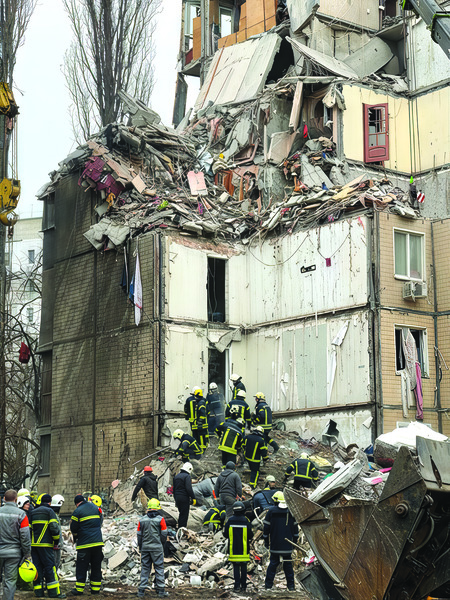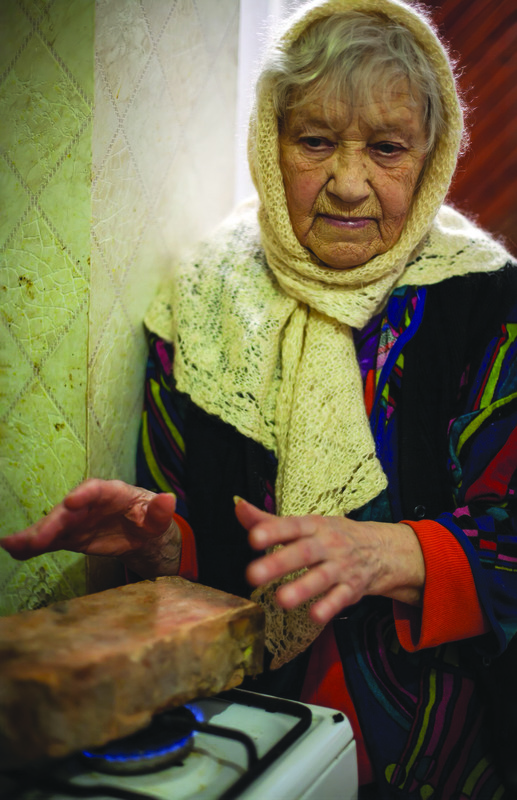Now in its third winter of war, the plight of Ukraine’s Jews and Jewish communities is no longer headline news. Israel, hostages, Gaza, a U.S. election, plane crashes, protests, antisemitism, wildfires, and so many other news-capturing events have diverted the world’s attention from the needs in Ukraine.
To remind the world, or at least Jewish Tidewater, of the continued need of support for Ukraine, Inna Vdovychenko, a member of JDC’s Ukraine Crisis Team, visited Virginia Beach last month to update some members of the community on the continuing devasting situation in her beloved Odesa. She was joined by Eliza Prince, JDC’s senior development officer, and Annie Sandler, JDC board president.
A teacher in “her previous life,” Vdovychenko thanked everyone for being willing to listen to the condition of her country and the people living there. Ukraine, she said, is now the “capitol of amputations of the world” as the “shellings have become much worse than before.”
Prior to the war, Ukraine was home to approximately 200,000 Jews. Now, that number is about 150,000. Those who have made the decision to stay often do so because men are not permitted to leave and the women don’t want to abandon their husbands, brothers, fathers, sons.
Odesa, where Vdovychenko lives, is situated 275 miles south of Kyiv on the Black Sea. Vdovychenko shared that the first mayor of Tel Aviv, Mayor Dizengoff, lived in Odesa, which explains why Tel Aviv’s architecture and layout of the city so closely resembles that of Odesa’s.
Prior to the war’s start on Feb. 24, 2022, Odesa’s estimated Jewish population was 35,000. Today, it is 23,000, as the majority of the Jews continue to live there – many are elderly and cannot leave. Of those who have left, however, Vdovychenko expects very few to return. “Everyone thinks,” Vdovychenko said, “that Odesa is the most Jewish city in the Former Soviet Union.”
Home to nine ports (only three are currently operational), 12 universities, 10 theaters, and many markets, Odesa had been a robust, cosmopolitan city.
Now, more than 1,000 days into the crisis, attacks continue – targeting both infrastructure and civilians. When the sirens sound in advance of the incoming drones and missiles, Vdovychenko says there’s little to no time to get to a shelter, of which there are not enough. After the attacks, the community regularly loses power, water, public transport, internet, and phone service. In fact, the power grid has been attacked 1,000 times since Oct. 2022. To demonstrate the condition of the water, Vdovychenko held up a small bottle of what looked like tea. When she said it was what came from the tap, there were audible groans in the room on the Sandler Family Campus.
Homes, hospitals, schools, and malls have been destroyed.
Vdovychenko sleeps on the floor of her closet at night out of fear of attacks.
The accumulated stress, she says, is extremely wearing, especially on the children and elderly, who also are sleeping in makeshift shelters and often in the cold, as heat is usually non-existent. Communication – phone and internet – is also poor, as the absence of power makes it impossible.
Inflation is another source of suffering. Since 2022, gasoline prices are up 80%; electricity is up 83%, and bread and milk have increased 30%. A typical senior receives an average of $71 to $90 per month. Vegetable borscht, Vdovychenko says, is now a luxury. “A Pensioner must spend up to 50% of their pension to eat one plate of borscht a day (no protein),” she says.
Vdovychenko shared stories of hardship and heartbreak for all ages. She spoke of a woman who puts a brick on her stove to warm her hands, of a mother caring for her disabled child, of all who suffer from lack of clean water, of the flights of stairs that must be climbed because the elevators can’t operate, of the children who cannot go to school and must sleep in corridors to be safe from incoming bombs.
Expressing appreciation to United Jewish Federation of Tidewater and other donors, Vdovychenko said that in Ukraine, “We have a network of 16 Heseds – Jewish Centers – that were established by JDC, seven flagship JCCs, and about 3,000 volunteers and teens who are connected to BBYO. If we had not built this network with the support of your Federation, we would not be as efficient now as we are.”

As the devastating situation rages on, Ukraine’s Jews are clearly in distress. Still, in the face of this ongoing conflict, JDC continues lifesaving care for tens of thousands of Ukraine’s most vulnerable Jews. Vdovychenko helps distribute that care.
Through all the trauma, Vdovychenko said JDC “instills Jewish values, Jewish hope.”
“I’m a vessel of people’s grief and I’m full,” she said.
“Let’s not forget Ukraine,” said Sandler.
At the conclusion of Vdovychenko’s presentation, the most often asked questions were, “What can we do? How did we not know?”
Vdovychenko’s response: “Please share these stories. We have hope. Thank you.”
JDC, a partner agency, is a recipient of funds from United Jewish Federation of Tidewater.
Ukraine Crisis: JDC’s Impact in Numbers
(as of December 2024)
54,800+
vulnerable Jews in Ukraine have received assistance since the start of the crisis
36,300+
vulnerable Jews receiving ongoing emergency aid, like food, medicine, homecare, and evacuation services
40,000+
refugees provided vital necessities like food, medicine, and psychosocial aid
1.6+ MILLION
pounds of humanitarian aid delivered to Jews in Ukraine and those who have fled to Moldova
9,000+
refugees receiving ongoing assistance from JDC and local Jewish communities in Europe
67,600+
calls fielded by emergency hotlines and Heseds
29,000+
Jews in need provided winter relief, including coal, blankets, and heaters
6,900+
internally-displaced persons (IDPs) have received life-saving assistance from JDC and local Jewish communities in Ukraine

